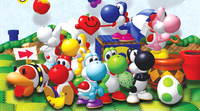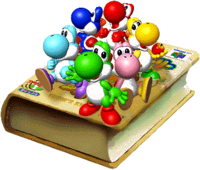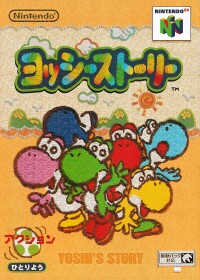Yoshi's Story: Difference between revisions
RubberLuigi (talk | contribs) m (→Yoshi's Moves: spelling) |
|||
| Line 235: | Line 235: | ||
==References to other games== | ==References to other games== | ||
*''[[Super Mario World 2: Yoshi's Island]]'' - ''Yoshi's Story'' was originally to be called ''Yoshi's Island 64''. | *''[[Super Mario World 2: Yoshi's Island]]'' - ''Yoshi's Story'' was originally to be called ''Yoshi's Island 64''. Also, a small portion of the 'Flower Garden' track can be heard 43 seconds into 'Games of Happiness' | ||
==References in later games== | ==References in later games== | ||
Revision as of 04:02, November 9, 2015
Template:Articleabout Template:Infobox Yoshi's Story is a Yoshi game released for the Nintendo 64. It serves as sort of a spiritual sequel to Super Mario World 2: Yoshi's Island. It was released in 1997 in Japan, and a year later in 1998 in the United States. Later, it received a port to the Virtual Console for the Wii in Fall of 2007 for all regions. The music of Yoshi's Story was composed by Kazumi Totaka, who voices Yoshi in this game. It possesses similar mechanics to the Yoshi's Island series of games, but does not include Baby Mario.
An unnamed Yoshi tech demo was unveiled at the time of the Game Boy Advance's first announcement. The title was seemingly either a port or direct sequel to Yoshi's Story, but it is unknown if it was simply meant as a demo or was cancelled. Years later, a Yoshi title called Yoshi Topsy-Turvy was released which featured the same art style and mechanics as Yoshi's Story and was perceived as a sequel. Yoshi's Story was also the first Mario/Yoshi game on the Nintendo 64 released in North America to be rated E for everyone due to the changeover by the ESRB from the previously used K-A "Kids to Adults" rating in 1998.
Story
Baby Bowser has turned Yoshi's Island into a picture book and has stolen the Super Happy Tree. Six baby Yoshis take it upon themselves to defeat him, meaning they must venture through six "pages" of the island before they can confront him. Each level is made of some kind of material (e.g., clay, denim, cardboard, newspaper, etc.) and has its own distinct style.
Gameplay
Yoshi's Story is played much like Super Mario World 2: Yoshi's Island, although a few aspects were tweaked or removed, such as the timer that counted down for Baby Mario when Yoshi was hit or Yoshi's ability to morph. To complete a level, the Baby Yoshis have to eat exactly thirty Fruits scattered through the level. Before starting a level, the Player has to select a Baby Yoshi. Each Yoshi has different taste when it comes to Fruits and Shy Guys and will recover more health (and score more points) if it eats a Fruit or a Shy Guy that is of its own color. The top left corner of the screen has a flower which serves as the life bar; the flower's petals will fall off as Yoshi loses more health, and its facial expression will also change accordingly (happy when full, sad when dying). Certain characters aid the Yoshis in various ways, including Miss Warp, who can teleport the Yoshis to different parts of the level, and Poochy, who can find hidden objects from far away.
If a Baby Yoshi is defeated within the level, this Baby Yoshi will be taken to Bowser's Castle by Baby Bowser's Toadies. If all of the Baby Yoshis are kidnapped, the game is over. However, any lost Baby Yoshi (aside from the secret, unlockable Black and White Yoshis) can be saved by finding a White Shy Guy and finishing the level with it. When starting a game on either Story Mode or Trial Mode, the game will randomly select a "Lucky Fruit". Said Lucky Fruit automatically heals all of the Yoshi's life, even if the Yoshi is not supposed to like the fruit.
Each world has four different levels to chose from; once beaten, the player moves on to the next world, without visiting the other three levels. This means to play through every single level, the player must play through the game at least four different times, going to the unvisited levels in each world. The game has four different difficulty levels: novice, easy, medium, and hard.
Modes
Story Mode

The main portion of the game, the Story Mode contains 24 levels (four per world), but only six can be played during a single playthrough (the game jumps directly to the next world after a level is completed). The player can choose which of the four levels in page one they wish to start on. However, the choice of levels in later worlds is determined by the number of Special Hearts collected in the previous level. To finish each level, the Yoshis must eat 30 different fruits scattered throughout the level. Whenever a level is completed, the Baby Yoshis start singing and a text appears to explain what happened in the level.
Trial Mode
Trial Mode is a mode that allows the player to play any stage that they have beaten in the Story Mode. In order to unlock all the stages, the players must play the Story Mode at least 4 times and get all the Special Hearts from the stage that they were playing. This mode was created to save the player's highest score of the levels. To quit a stage, the ![]() +
+ ![]() buttons should be pressed together. Also, the player can't use Black Yoshi and White Yoshi; those are only playable in the Story Mode.
buttons should be pressed together. Also, the player can't use Black Yoshi and White Yoshi; those are only playable in the Story Mode.
Eating nothing but melons is a great method of increasing one's high score, although it can be really hard in some stages. If this is done, a marker appears at the end of the level. In order to eat all the melons from the stage, the player will need to Sniff-Sniff all the time to find hidden objects in the ground.
Also, if the player waits for two minutes and ten seconds, Totaka's Song is heard.
Practice Mode
The Practice Mode consists of an exclusive level in which the various controls and techniques of the games are explained. Also, this level does not have 30 melons in it.
Yoshi's Moves
The Baby Yoshis can perform various moves to complete their adventure. Most of these moves were taken from Yoshi's Island, although some were tweaked or now have a new function.
Jumping and Fluttering
By pressing the A button, the player can make Yoshi jump; by pressing A again and holding it, the player can make a Yoshi Flutter Jump. This helps the player get to higher places. It is possible to flutter longer by holding A after Yoshi grunts.
Swallowing
To Swallow an object, the Baby Yoshies have to lick with their tongues. It is possible to control the direction of the tongue with the Control Stick. Unlike Yoshi’s Island, Yoshi automatically ingests the things he eats with his tongue.
Throwing Eggs
When a Yoshi eats an enemy, it can turn into an egg. By pressing Z, Yoshi can aim the egg he made at various things, and throw it by releasing Z.
Ground Pound
To utilize this move, a Baby Yoshi must jump and quickly press down on the control stick. The Yoshi will pound the ground. A Ground Pound can be used to reveal a few items hidden in the ground or to defeat enemies.
Sniff-Sniffing
A move exclusive to this game, Sniff-Sniffing is helpful in finding objects hidden in the ground. To execute it, the player must press R. If the Baby Yoshi is near an object, a ! will appear next to the Baby Yoshi's head. If Baby Yoshi is standing on a hidden item, he will wave at the player. Any objects hidden in the ground can be revealed by ground-pounding them. Poochy can be found in a few levels and will sniff for the Yoshi Clan.
Characters
Playable
All the following Yoshis are playable. Their name is listed next to what their favorite fruit in the game is (since when a Yoshi eats one of its favorite food, the life bar heals more than it usually would). Eaten Melons will also have this effect, no matter which Yoshi color it is.
- Red Yoshi - Apple
- Yellow Yoshi - Banana
- Green Yoshi - Watermelon
- Pink Yoshi - Apple
- Blue Yoshi - Grapes
- Light Blue Yoshi - Grapes
- Black Yoshi (Unlockable) - Likes all fruit types.
- White Yoshi (Unlockable) - Likes all fruit types.
Allies
- Balloon Bully
- Dragon
- Ghost Rider
- Message Block
- Huffin' Puffin
- Neuron
- Miss Warp
- Poochy
- Power Bee
- Snake
- White Shy Guy
Enemies
Bosses
Mini-Bosses
Items and objects
Various items are found by the Baby Yoshis in their adventure. They are:
- Yoshi Eggs are the Yoshis' primary weapons.
- Heart Coins are found throughout the levels; they only exist for scoring purpose.
- Various kind of Fruit appears, the most prominent being the Melon, appearing 30 times in every level.
- Special Hearts unlock levels in Story Mode.
- Bob-ombs can be thrown, much like the Yoshis' Eggs.
- Heart Fruit will turn the Baby Yoshis into Super Happy Yoshi when eaten.
- Bubble Pops contains various objects and occasionally enemies.
- Message Blocks give help and information when jumped from below.
- ? Blocks contain hidden items, sometimes contain an Air Bag
- ? Switchs causes a variety of events.
- Surprise Balls allow baby Yoshis to reach higher ground by licking them.
Worlds and levels
Page 1: Beginning
Treasure Hunt
Surprise!!
Rail Lift
Tower ClimbPage 2: Cavern
Bone Dragon Pit
Blargg's Boiler
Jelly Pipe
Torrential MazePage 3: Summit
Cloud Cruising
Tall Tower
Poochy and Nippy
Frustration
Page 4: Jungle
Jungle Hut
Jungle Puddle
Piranha Grove
Neuron Jungle- World5YS65.jpg
- World6YS65.jpg
Page 6: Finale
Mecha Castle
Lift Castle
Ghost Castle
Magma Castle
Pre-release and unused content
- Main article: List of Yoshi's Story pre-release and unused content
Staff
- Main article: List of Yoshi's Story staff
Gallery
Media
Appearances in other media
Yoshi's Story was the subject of volumes 19 and 20 of Super Mario-Kun.
Yoshi's Story was also featured in Club Nintendo's comics. These were later collected in a comic book titled Yoshi's Story Comic.
Volume 19 of Super Mario-Kun.
Volume 20 of Super Mario-Kun.
References to other games
- Super Mario World 2: Yoshi's Island - Yoshi's Story was originally to be called Yoshi's Island 64. Also, a small portion of the 'Flower Garden' track can be heard 43 seconds into 'Games of Happiness'
References in later games
- Super Smash Bros. - A stage called Yoshi's Island is based off Yoshi's Story. Yoshi's moves, animations and voice clips are the same as in Yoshi's Story.
- Super Smash Bros. Melee - The Yoshi's Island stage from Super Smash Bros. returns, and a new one called Yoshi's Story is playable.
- Super Mario Sunshine - The main way of keeping the Yoshis healthy in this game is by eating fruits.
- Yoshi Topsy-Turvy - Yoshi's Island is turned into a story book again.
- Mario Superstar Baseball - The Super Happy Tree appears in Yoshi's themed field.
- Super Smash Bros. Brawl / Super Smash Bros. for Nintendo 3DS - A remix of the ending theme from Yoshi's Story plays on the Yoshi's Island stage in both games.
- Super Smash Bros. for Wii U - The same remix from Brawl and 3DS version plays on the Woolly World stage.
- Mario Super Sluggers - The Super Happy Tree can be found in Yoshi Park again. The park plays a remixed version of the theme music.
- Mario & Sonic at the London 2012 Olympic Games - Rail Lift appears as the setting of the Dream Long Jump event.
- Mario Tennis Open - All the Yoshis from Yoshi's Story (including the unlockable Black and White Yoshis) are playable in the game.
- Super Mario 64 DS - The Yoshis health meter reappears in one of the minigames.
- Mario Golf: World Tour - Yoshi's Lake Course is inspired by Yoshi's Story.
- Nintendo Land - The Yoshi's Fruit Cart attraction requires the player to collect fruits. Also, Treasure Hunt's level theme and the ending theme appear here.
Trivia
- Yoshi's Story is notable for being one of the very few Yoshi games to not involve Mario. Both Mario and Luigi are only briefly mentioned on newspaper headlines in the background of level 2-3 and 2-4. Baby Bowser also calls Yoshi "Mario's pet".
- The game sold 1.28 million copies in America and 2.85 million worldwide.
- The Japanese box art (shown above) is very similar to the cover of the American game booklet.
- When the page turns, the player can hear the Baby Yoshis singing "Nintendo" in the background.
Template:BoxTop Template:Yoshi series
| Nintendo 64 games | ||
|---|---|---|
| Super Mario franchise | Super Mario 64 (1996) • Mario Kart 64 (1996) • Mario no Photopi (1998) • Mario Party (1998) • Mario Golf (1999) • Mario Artist: Paint Studio* (1999) • Mario Party 2 (1999) • Mario Artist: Talent Studio* (2000) • Mario Artist: Communication Kit* (2000) • Mario Tennis (2000) • Paper Mario (2000) • Mario Artist: Polygon Studio* (2000) • Mario Party 3 (2000) • Dr. Mario 64 (2001) | |
| Donkey Kong franchise | Diddy Kong Racing (1997) • Donkey Kong 64 (1999) | |
| Yoshi franchise | Yoshi's Story (1997) | |
| Crossovers | Super Smash Bros. (1999) | |









